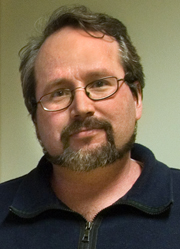

 Adam Arkin, 43, a leading authority on the evolutionary design principles of cellular networks and populations and their application to systems and synthetic biology, has been named the new director of Berkeley Lab’s Physical Biosciences Division (PBD). The appointment was made by Berkeley Lab Director Paul Alivisatos and is effective immediately.
Adam Arkin, 43, a leading authority on the evolutionary design principles of cellular networks and populations and their application to systems and synthetic biology, has been named the new director of Berkeley Lab’s Physical Biosciences Division (PBD). The appointment was made by Berkeley Lab Director Paul Alivisatos and is effective immediately.
“The Physical Biosciences Division is home to some of the most exciting science at the Laboratory and it was important we find a leader who could keep the momentum going,” Alivisatos said in making his announcement to the PBD staff. “Graham Fleming, who founded the division, was an outstanding first director. He was followed by Jay Keasling who oversaw the creation of the Joint BioEnergy Institute (JBEI) during his tenure, and when Jay stepped down, Paul Adams stepped up and did an outstanding job in an acting capacity. We expect this PBD tradition of excellent leadership to continue under Adam Arkin.”
In his first address to the staff as division director, Arkin noted that he was Fleming’s first hire in 1998 as a PBD staff scientist.
“Graham was an inspiration to me and showed me what it takes to build a Division. I was then fortunate enough to collaborate with and serve under Jay Keasling who showed me how to organize an effective and exciting mission-oriented scientific institute,” Arkin said. “Now I get to stand on their shoulders, so to speak. We have many great opportunities in this division and I look forward to working with staff and meeting the challenges ahead.”
Arkin has been serving PBD as the head of its Synthetic Biology Department. In addition, he directs JBEI’s Bioinformatics Group and Berkeley Lab’s Virtual Institute of Microbial Stress. He is a Professor of bioengineering at the University of California (UC), Berkeley and was an investigator with the Howard Hughes Medical Institute (HHMI) until 2007.
Arkin received his undergraduate degree in chemistry from Carleton College in 1988 and his Ph.D in physical chemistry four years later from the Massachusetts Institute of Technology. He then pursued postdoctoral studies at Stanford University in chemistry with John Ross and in developmental biology with Harley McAdams and Lucy Shapiro. In 2000 he was featured in a special edition of Time magazine on “Future Innovators,” is a member of the first class of the Technology Reviews TR100, and in 2007 he was elected as a Fellow in the American Academy of Microbiology.
The thrust of Arkin’s research has focused on developing the physical theory, computational tools and experimental approaches for understanding cellular processes critical to life. The goal is to provide a framework that will facilitate the design and engineering of new functions and behaviors in cells through synthetic and systems biology. He once compared synthetic biology to computer design and said, “Most genetic engineering has been done by hook-or-by-crook. It takes a lot of trial-and-error to build simple things into cells, like the ability to produce a lot of a functional protein. We want to actually program cells as if they're computers or design them as if they were advanced aircraft so they can do much more complicated tasks of benefit to society."
Today at Berkeley Lab is produced by Public Affairs' Communications Department